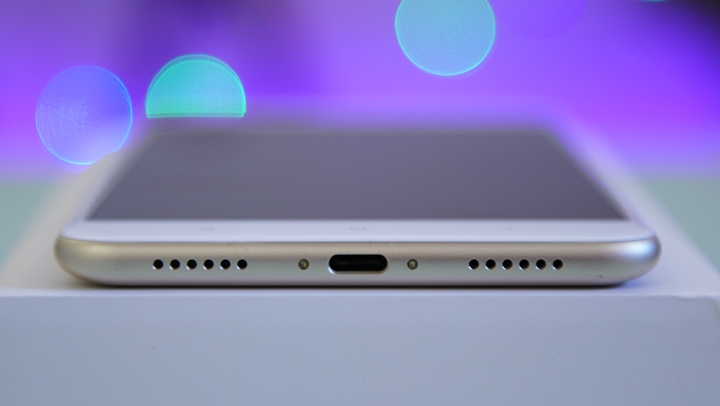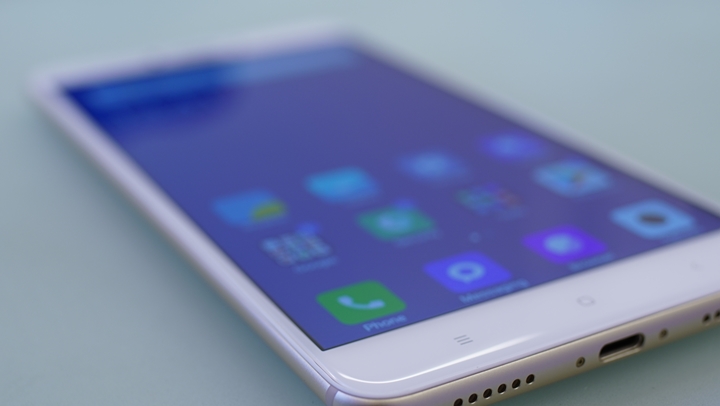The successor to last year’s Mi Max is here, and it is just as huge. It packs 6.44 inches of screen real-estate, mid-range specs, and a gorgeous UI. Let’s begin.

Table of Contents
Reiterating the size, it sits at 6.44 inches. It, again, carries the same design language as the previous Mi Max and the Mi Note series. It has a solid metallic unibody, but still manages to stay quite slim despite the bump up in battery capacity. The gold model we have has a white front panel, with Corning Gorilla Glass 4 covering the IPS display. While not “edge-to-edge”, the bezels on this phablet are pleasantly slim. If you covered the bottom half, it can actually be easily mistaken for a giant iPhone.

Starting at the bottom of the front panel, we have capacitive touch home, return, and overview buttons. While capacitive touch buttons do reduce the profile of a device, we ended up accidentally pressing them more often than not while holding the phone in a landscape orientation.

Moving up top, we have the 3.5mm headphone jack, IR blaster for controlling your appliances, and a noise cancelling microphone. Strangely though, our unit did not come with any headphones.

On the right, we have the power button and volume controls, while the SIM card slot is on the left. The SIM tray supports two possible configurations, a nano SIM and micro SIM, or a micro SIM and a micro SD card up to 128GB. The power and volume buttons feel heavy and metallic, which is hopefully a sign that they have long lifespans.

Down below, there is a USB Type-C port and a stereo speaker on the right side, which actually sound decent. Opposite the speaker is the primary microphone.

As for the rear panel, the only thing that has changed from the previous button is the placement of the antenna bands. It is smooth and has a matte finish for whatever color you picked up, and it curves around the edges before meeting the front panel.

Again, there is a recessed fingerprint scanner at around the upper middle. Xiaomi seems to have positioned it slightly lower this time around for easier access. It is accurate and has a quick response time, and you can add up to 5 fingerprints. This allows you to unlock the device, though you need to use the power button on the right side to lock it.

Even for someone with large hands, handling the Mi Max 2 takes a bit of getting used to, but the amount of screen real estate you get in return is a sizable trade-off.
The 6.44-inch IPS display runs at Full HD resolution, or 1920 x 1080, equal to 342ppi. It is quite bright, with crisp details and rich colors. It performs quite well when watching videos or playing games.

The speaker is not so loud and is lacking in the bass department, but audio quality is crisp and is adequate for personal listening.
The Mi Max 2 is running on MIUI 8, a proprietary deployment of Android 7.0 Nougat.
It is notably brighter and more colorful than the previous MIUI 7. New features have been added such as Wallpaper Carousel, which cycles your home/lock screen wallpaper based on your interests, and Second Space, which allows you to have two sets of independent home screens each with their own unique layout and data. There is also an app called Security, which handles all your optimization with one touch.
It comes pre-installed with the usual Google apps, as well as MIUI’s proprietary basic apps. It was nice to see that there wasn’t any bloatware included. The unit we reviewed was the 64GB model, and out of the box, it has an impressive 54.37GB of usable storage.
One major drawback, it doesn’t come with an app drawer. If you don’t plan on getting a third-party app drawer from the Play Store, then you’ll have to settle for folders and more home screens, à la iOS.
The 12MP Sony IMX386 PDAF rear camera takes great photos in well-lit to medium lighting conditions, not performing so well in low light. The manual mode is limited, however, it supports fully manual White Balance control, shutter up to 32 seconds, and ISO up to 3200. The 5MP front-facing camera is decent as well, and is sufficient for quick selfies.
With good lighting, the camera performs very well, and the image output is sort of flat, making it ideal for some photo editing later on.
Here are some sample photos we took:
Video is also decent at 1080p, and the phone does also support 4k video recording, which we would not recommend, as artifacts and a strange digital structure are present. There are also additional features such as slow-motion and timelapse modes. However, there is no manual mode for video, and you cannot even choose what frame-rate to shoot at.
Here are some sample videos we took using the rear camera:
While we do get a bit of a downgrade in the CPU and GPU departments with the Snapdragon 625 (the original Mi Max has the Snapdragon 650), we do get a bump up in RAM, there being 4GB now. Heavy hitting games like Injustice: Gods Among Us and Asphalt 8 are playable, but are choppy for the most part and sometimes laggy. This may be attributed to the step down in GPU, as the Mi Max 2 uses the Adreno 506, while the Mi Max used the 510.
It performed quite well in our synthetic benchmarks, however, due to the slight downgrade in CPU and GPU, it did not surpass the original Mi Max’s scores.
Benchmark scores:
AnTuTu Benchmark – 63,111
Geekbench – 859 (Single-core), 4195 (Multi-core)
PCMark Work 1.0 – 5,499
PCMark Storage – 3278
AndroBench – 267.94 MB/s (Seq. Read), 138.02 MB/s (Seq. Write)
3DMark – 12408 (Ice Storm), 8254 (Ice Storm Extreme)
Vellamo – 2943 (Browser), 1403 (Metal), 2179 (Multi-core)
While very responsive and great for multitasking and productivity, the Mi Max 2 is not great at running graphically demanding games.
Voice calls are very clear on the Mi Max 2, and we had no problems in that regard, with the same going for SMS. GPS is quite accurate and responsive, and we had no problems using Waze and Google Maps. In addition, it has NFC, LTE-A, dual-band WiFi, and Bluetooth 4.2 capabilities.
Battery life is impressive, and the presence of the 300mAh increase over the Mi Max is definitely felt. We scored 16 hours and 7 minutes in PC Mark’s Battery Test, and our video loop test lasted for 20 hours. Charging time is about 2 hours using Qualcomm Quick Charge 3.0, which is impressive given its massive 5300mAh battery.
While phablets are still too big for constant everyday use due to their large pocket footprint and degree of difficulty to hold, they are still perfect for leisurely use. The Mi Max 2 was an outstanding device to use for web browsing, social media, watching videos, and light gaming. Knowing that it will last a very long time on heavy use with its large battery makes it perfect for just that.

Given its nice design, great camera, good multitasking performance, long battery life, and affordable price point, we loved the Mi Max 2.
Xiaomi Mi Max 2 specs:
6.44-inch IPS LCD @ 1920 x 1080 pixels, 342ppi
Qualcomm Snapdragon 625 octa-core CPU
Adreno 506 GPU
4GB RAM
64GB/128GB internal storage
Expandable via microSD, up to 128GB (Uses SIM 2)
12MP Sony IMX386 PDAF rear camera w/ LED flash
5MP wide-angle front camera
Dual SIM (Nano)
LTE-A
Wi-Fi 802.11ac, dual-band
Bluetooth 4.2
GPS w/ A-GPS, GLONASS
NFC
IR blaster
Fingerprint scanner
Gyroscope
Stereo speakers
5300mAh non-removable battery w/ Quick Charge 3.0
Android 7.0 Nougat w/ MIUI 8
What we liked about it:
*Beautiful design
*Good build quality
*Large crisp display
*Great camera
*Sleek UI
*Very long battery life
*Affordable
What we did not like:
*Sluggish performance in graphics-heavy games
*Too large to keep in the average pocket
The Xiaomi Mi Max 2 is available at Widget City for Php15,500USD 264INR 22,391EUR 252CNY 1,924. You may check the listing here.

YugaTech.com is the largest and longest-running technology site in the Philippines. Originally established in October 2002, the site was transformed into a full-fledged technology platform in 2005.
How to transfer, withdraw money from PayPal to GCash
Prices of Starlink satellite in the Philippines
Install Google GBox to Huawei smartphones
Pag-IBIG MP2 online application
How to check PhilHealth contributions online
How to find your SIM card serial number
Globe, PLDT, Converge, Sky: Unli fiber internet plans compared
10 biggest games in the Google Play Store
LTO periodic medical exam for 10-year licenses
Netflix codes to unlock hidden TV shows, movies
Apple, Asus, Cherry Mobile, Huawei, LG, Nokia, Oppo, Samsung, Sony, Vivo, Xiaomi, Lenovo, Infinix Mobile, Pocophone, Honor, iPhone, OnePlus, Tecno, Realme, HTC, Gionee, Kata, IQ00, Redmi, Razer, CloudFone, Motorola, Panasonic, TCL, Wiko
Best Android smartphones between PHP 20,000 - 25,000
Smartphones under PHP 10,000 in the Philippines
Smartphones under PHP 12K Philippines
Best smartphones for kids under PHP 7,000
Smartphones under PHP 15,000 in the Philippines
Best Android smartphones between PHP 15,000 - 20,000
Smartphones under PHP 20,000 in the Philippines
Most affordable 5G phones in the Philippines under PHP 20K
5G smartphones in the Philippines under PHP 16K
Smartphone pricelist Philippines 2024
Smartphone pricelist Philippines 2023
Smartphone pricelist Philippines 2022
Smartphone pricelist Philippines 2021
Smartphone pricelist Philippines 2020
N says:
Im not getting it. 342 ppi and “quite bright, with crisp details and rich colors” do not seem to be right. Enlighten me on this please.
Cj says:
Does the 4g LTE-A connection works with our local Net providers such as Smart? Is the global rom available already for mi max 2? Thanks.
Shan says:
A great device. The design, camera, battery life and OS all work together really well!
Joey Boy says:
Hi Joey Maceda your article is Misleading wala po NFC ang Mi Max 2
Giancarlo Angulo says:
Question :
Does the Mi Max 2 support the 700 MHz band?
Also how does one spot support for this band in specification sheets of mobile phones?
Thanks in advance
Amber says:
Just wanna ask po.. Almost 1 year npo ang phone sa akin… Maganda naman po siya pero may problema ako ang charging niya baliktad after maka charge ng ilang percent instead increasing decreasing na naman… Ayoko pa naman palitan yung phone kase mabilis p rin maganda gamitin pero sa charging lang talaga… Ano po kaya maganda gawin?